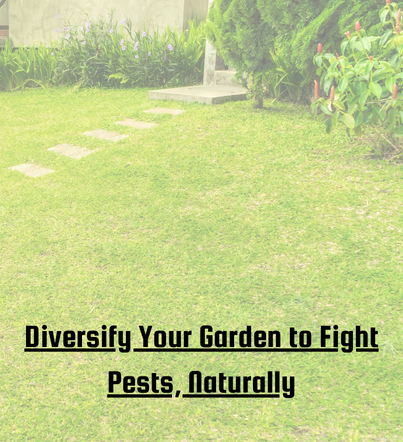Did you know that you can create (or enhance) your garden to naturally fight pests? Diversifying your landscape with more plant species can enhance the environment and attract pollinators that serve as natural ‘enemies’ to common garden pests.
Below are four ways to diversify your garden and enable natural enemies that will protect your gardens year-round.
Understand What Natural Enemies Want
Natural enemies provide biological control and under optimal conditions, they prevent plant-feeding herbivores from reaching 'pest' levels. By diversifying your garden, you are essentially giving natural enemies a habitat that allows them to survive and increase.
This means finding plants that create optimal conditions for these insects to obtain food, shelter, favorable temperatures, and habitats that are free of toxic chemicals. Many athletically pleasing, commonly grown flowers include the sunflower, cosmos blanket flower, and the coreopsis plant. Find groups of flowers that bloom at different times to provide natural enemies with sources of nectar throughout the growing season.

Plan Before You Purchase
Before you head to your local garden center, ensure that your landscape will serve more than one purpose. For example, your garden might: prevent soil erosion, replenish nutrients in the soil, support beneficial insects, grow your own food, etc. Also, consider color, the season of bloom, shape, and what flowering plants will help attract natural enemies.
Studies show that not only do flowering plants reduce the population of lace bugs, but their attractiveness also lends to their ability to support both natural enemies and pollinators.
Consider These Flowering Plants
Below are a few examples of flowering plants that provide season-long blooms and nectar for pollinators. These bright, beautiful greens also attract a diverse group of natural enemies that can help fight common garden pests:
Shasta daisies. These flat open flowers are attractive to larger enemies such as flower flies and spiders.

Alyssum. This plant has clusters of very small flowers. Alyssum may be ideal for small wasps that attack scale insects and aphids.

Monarda. These have tubular flowers that are attractive to larger predatory wasps that hunt and kill caterpillars and white grubs in the soil.

Coneflowers. These are excellent resources for native and non-native bees like honeybees. Coneflowers also attract predatory beetles whose larvae are predators of soil-dwelling pests and other soft-bodied pests on plants.

Avoid Spraying Pesticides
At Emerald, our Plant Health Care Program is a year-round, all-inclusive method that protects your landscapes from damaging insects and diseases. Spraying pesticides is not only harmful to the environment but is a counterproductive measure if you've invested in a diverse garden.
Our trained technicians at Emerald will visit your property several times each year, scout your gardens for pest problems, and apply safe and environmentally responsible methods to your plants.










